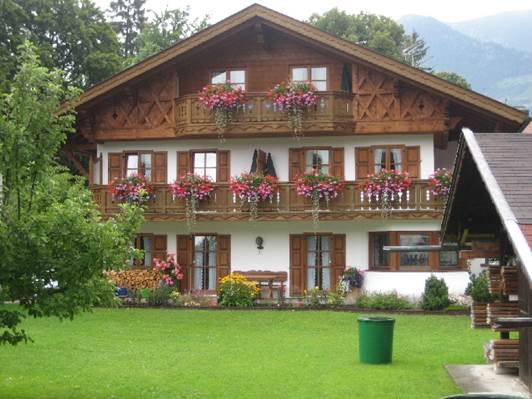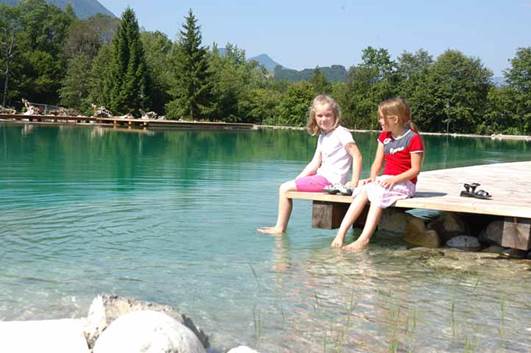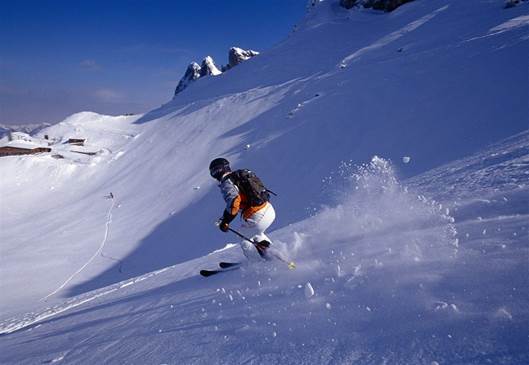Later that day, I travel onwards via train
to the small town of Inzell, which is another pleasant surprise, located as it
is roughly mid-way between Munich and Salzburg. I arrive there after switching
to the bus after a twenty minutes or so transfer from Traunstein, where I left
the train. It’s snowing heavily when I get there but, as per usual, the roads
remain navigable and the pavements are relatively clear. That’s the thing you
really notice in this part of the world, everyone knows the job they have to do
in terms of snow clearance, from farmers who get paid in winter to keep roads
clear with their tractors through to residents who diligently clear the patch
outside their house. This is a very traditional town and there’s a real air of
community here, so little wonder that it is well known for attracting families
who can stay at the well-appointed local campsite, in cozy B&B’s or hotels
in the area.

The
Bavarian style is so charming and of course those flower boxes are to die for
Adding to that appeal, there are also
plenty of outdoor activities to enjoy, including 3-hour cross country hikes
allowing you to get some stunning shots, plus the rather more testing Nordic
walking, with no end of different tracks and trails to work your way around.
Those less keen on that kind of strenuous exercise should try the great facilities
at Inzell Water Park, which boasts a natural lake. If you want to get the best
from this and other activities in the area then it’s good idea to invest in the
Inzell Card, which can get you into all of the main attractions in one fell
swoop. It’s possible to enjoy everything from snow tubing, tobogganing and the
local cable cars too, with the views that come with them. Try the Hochfelln
cable cars for panoramic views of the Chimera and Tyrolean Alps from the summit
at 1,674-metres or try the Ruaschberg cable car for another angle, which tops
out at some 1,670-metres. On the way back you can also take in the Woodcutters
museum and end the day with a visit to the Hofbrauhasu brewery down in
Traunstein, where you can discover the finer points of Bavarian beer brewing.

Inzell
Water Park boasts a natural lake
Touring around the area in the car, it’s
easy to see the appeal of this place in the winter. One thing you notice once
you leave the town is how quiet it is, with the snow deadening things even
more. If you’re looking for snowscapes to shoot then there is plenty to
experiment with in this neck of the woods. But, by way of a detour, we also
take a trip to the Max Aicher Arena, which is a huge and very modern indoor
speed skating track that was opened in 2011, although the area has an
illustrious association with the sport going back over 50 years or so. Inzell
and the surrounding landscape is also well known for its other winter sports
activities, taking in everything from Biathlon challenges to husky races.
There’s also the Inzell Balloon festival in the summer months that sees large
collections of hot air balloons sweeping majestically over the mountain
hillsides. We even drop in to the SoccerPark nearby for a coffee. This is a
place where locals and tourists alike come to play a sport that is one part
football and one part golf and is, apparently, becoming hugely popular in
Germany.
Off for lunch
After shooting in and around the town, it’s
soon time for lunch, so we head for a local butchers shop that has a restaurant
too. Now, it’s not every day you get a behind the scenes tour of one of these
places, but Hubert Hirschbichler the owner (and himself a former speed skater)
kindly allows me into the back of the shop for a look around. It’s a
fascinating insight into meat production and the very enthusiastic butcher
explains that they kill the animals on site and then proceed to use just about
every last bit of it for a whole variety of produce. I have to pick my way
gingerly across the floor as it’s like a skating rink and there’s also a lot of
condensation so though pictures are allowed, not many come out due to a steamed
up lens, but I do get a chance to see a very large vat of blood, some freshly
slaughtered carcasses of deer and pig plus the chance to take a few snaps of a
man making very large sausages. Back out front, it’s easy to taste the
difference as I tuck into a plate of pork and potatoes with a nice sauerkraut
salad, all washed down with some local beer.
After the hearty lunch I’m also ready for a
snooze rather than a trek to the next location, but with six minutes before the
bus arrives, I’m ushered into a next-door relaxation/wellness type place that
has one of those incredibly sophisticated massage chairs. Even with my winter
coat and shoes on the appeal is easy to see as the owner clamps on a pair of
headphones complete with calming German dialog and stress-relieving background
music and it makes for a great way to wait for a bus. I emerge just in time to
board feeling surprisingly chipper for all the kneading my back and legs have
just taken. It’s another short bus ride back down the hill to Traunstein and
then the train will take me to the next port of call, via Munich.

Garmisch-Partenkirchen
(it used to be two separate resorts) is Germany's most famous ski resort and is
part of a skiing area which has 38 lifts and 43 slopes
Travelling during the day means the trains
are reasonably quiet, so it gives me a chance to sit back and relax on the way
up to Munich. On arrival, I need to change in order to get another line back
down to the Zugspitzregion. So I jump on a train bound for
Garmisch-Partenkirchen, although the only minor issue is that I get off my
first train on platform 3 and the connection is on platform 37. Plus I’ve only
go about 3 minutes to get there, so it’s a bit of a dash to make it while
carrying a backpack that seems to be getting more full of local literature by
the minute.